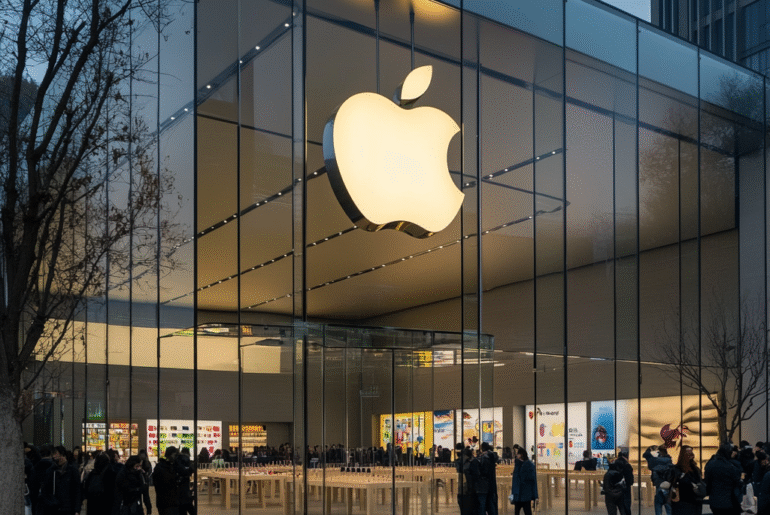This article may contain references to products or services from one or more of our advertisers or partners. We may receive compensation when you click on links to those products or services. Nonetheless, our opinions are our own.
The information presented in this article is accurate to the best of our knowledge at the time of publication. However, information is subject to change, and no guarantees are made about the continued accuracy or completeness of this content after its publication date.
If you keep up with what’s going on in the tech industry, you may have seen the news about Apple’s recent problems in China. This market, which was once very important to Apple’s success, is now going through a significant downturn. This change means more than just Apple. We will examine the main reasons for the decline in Apple’s sales in China. We’ll also look at the economic and competitive pressures that are at work and what this could mean for both investors and customers.
- Current Market Dynamics Behind Apple’s Decline in China
- Factors Driving Consumer Sentiment Away from Apple Products
- Identifying Growth Opportunities for Apple in Emerging Chinese Markets
- Practical Steps for Apple to Rebuild Trust and Revitalize Sales
- Navigating Personal Investment Decisions Amidst Apple’s Market Challenges
- Educating Yourself on Market Trends to Make Informed Financial Choices
- Conclusion
- Frequently Asked Questions
- Recommended Reads
Current Market Dynamics Behind Apple’s Decline in China
People should think about the bigger picture when they look at global investments, like Apple’s sales drop in China. There is more competition in the smartphone market now that local brands like Xiaomi, Oppo, and Vivo are quickly coming up with new ideas. These companies are not only selling high-quality devices at lower prices, but they are also putting money into features that Chinese customers want.
Apple also has a big problem with China’s growing focus on supporting its own technology. These things are hurting not just market share but also brand loyalty.
Price Sensitivity: As the economy shifts, consumers are becoming more cost-conscious.
Brand Perception: Loyalty to local brands is increasing, affecting Apple’s appeal.
Regulatory Challenges: Government policies are increasingly favoring domestic manufacturers.
| Brand | Market Share (%) | Features |
|---|---|---|
| Xiaomi | 15 | Affordable pricing, high specs |
| Oppo | 11 | Camera technology, stylish design |
| Apple | 9 | Premium quality, ecosystem focus |
These factors not only challenge Apple’s dominance but also present strategic considerations for investors seeking to understand evolving global tech trends.
Factors Driving Consumer Sentiment Away from Apple Products
If you look more closely at why people in China are less interested in Apple products, you’ll see that there are many factors at play. Many people think that Apple’s pricing strategies are becoming less and less in line with how the economy really works. Models with high prices may appeal to wealthy customers, but they may turn off budget-conscious customers, especially when similar models are available for less money.
Brand reliability is also affected by geopolitical tensions and problems with the supply chain that keep happening. Consumers are worried about Apple’s long-term future in the area because of news about tariffs, trade restrictions, and manufacturing risks.
| Brand | Average Price (USD) | Notable Features |
|---|---|---|
| Samsung | $800 | High-quality cameras, flexible customization |
| OnePlus | $600 | Flagship performance at mid-range pricing |
| Xiaomi | $500 | Excellent specs, aggressive pricing |
As competitive options grow more appealing, the perceived value of sticking with Apple diminishes. Consumers are increasingly motivated by price, innovation, and national brand alignment, rather than loyalty alone.
Identifying Growth Opportunities for Apple in Emerging Chinese Markets
While challenges mount, Apple still has paths to growth in China, especially in untapped or underserved market segments. Strategic adjustments could help the company regain momentum.
Localized Product Offerings: Develop products that resonate with regional preferences and habits.
Flexible Pricing Strategies: Introduce tiered pricing models that cater to varying income groups.
Enhanced Supply Chain Management: Invest in local partnerships to reduce delays and improve satisfaction.
Ecosystem Integration: Promote interconnected Apple devices and services to reinforce customer retention.
Demographic data also suggests growth potential in certain groups:
| Demographic Group | Potential Market Size | Interests |
|---|---|---|
| Urban Millennials | 100 million+ | Fashion, Technology, Sustainability |
| Young Professionals | 75 million+ | Productivity, Health, Fitness |
| Families | 50 million+ | Education, Safety, Entertainment |
Targeting these niches with tailored marketing and product development could offer Apple a second wind in the Chinese market.
Voted "Best Overall Budgeting App" by Forbes and WSJ
Monarch Money helps you budget, track spending, set goals, and plan your financial future—all in one app.
Get 50% OFF your first year with code MONARCHVIP
Practical Steps for Apple to Rebuild Trust and Revitalize Sales
To rebuild trust and boost sales, Apple must address both consumer perception and market engagement.
Transparency: Clearly communicate product updates, pricing models, and supply chain improvements.
Customer Feedback Initiatives: Create channels for user input to guide future offerings.
Localized Marketing Campaigns:
Partner with popular local brands.
Launch regionally relevant social media content.
Host community events to show investment in local culture.
These efforts would not only strengthen Apple’s reputation but also enhance its relevance in a competitive and nationalistic market.
For investors, Apple’s situation in China poses both risks and opportunities. To make informed decisions, ask:
How does this affect Apple’s global market position?
What is your personal risk tolerance?
Are you diversified enough across sectors?
Here’s a comparison of Apple’s recent regional sales performance:
| Market | Sales Growth (%) |
|---|---|
| China | -30% |
| North America | +5% |
| Europe | +2% |
These figures suggest that while China is a concern, other regions remain strong. Depending on your outlook and strategy, this could be a chance to reallocate or double down.
Educating Yourself on Market Trends to Make Informed Financial Choices
Monitoring global market trends is important for anyone managing personal finances. Apple’s decline in China illustrates how local economic and regulatory developments can impact international stocks.
Consumer Preferences: Shifting toward domestic brands, affecting foreign tech appeal.
Economic Outlook: Slower growth and reduced spending weaken demand for premium products.
Regulatory Environment: Foreign firms are under greater scrutiny, increasing operational risks.
| Factors | Impact on Apple |
|---|---|
| Consumer Preferences | Declining market share |
| Economic Conditions | Decreased revenue |
| Regulatory Changes | Operational challenges |
Knowing these things helps you make better choices, whether you’re deciding which smartphone to buy or looking at your tech portfolio.
Conclusion
Apple’s problems in China show that even the biggest companies can be affected by changes in the economy, changes in consumer preferences, and changes in the region. The story coming out of China is both a warning and a chance to learn for both tech-savvy investors and consumers. People can better manage their own money that is becoming more complicated by staying up to date on global events and responding with a calm, strategic mindset. Awareness and adaptability are your best financial tools, whether you’re buying a smartphone or making a stock decision.
Frequently Asked Questions
What factors are contributing to the collapse of Apple’s sales in China?
Rising competition from local brands, shifts in consumer behavior, economic headwinds, and increased regulatory scrutiny are all affecting Apple’s sales.
How has consumer behavior changed in China regarding Apple products?
Consumers are now favoring local smartphones that offer similar features at lower prices. National pride and perceived innovation from Chinese brands are also influencing buying choices.
What is the impact of China’s economic situation on Apple’s sales?
A sluggish economy and cautious spending have made high-end products like iPhones less attractive to average consumers, contributing to a drop in sales.
How is Apple responding to the sales decline in China?
Apple is exploring new pricing models, enhancing its local partnerships, and investing in regional marketing strategies to better connect with Chinese consumers.
What does the future hold for Apple in the Chinese market?
While Apple is adapting, ongoing competition and changing consumer preferences may delay recovery. Success will depend on Apple’s ability to innovate and respond to local market demands.

Reviewed and edited by Albert Fang.
See a typo or want to suggest an edit/revision to the content? Use the contact us form to provide feedback.
At FangWallet, we value editorial integrity and open collaboration in curating quality content for readers to enjoy. Much appreciated for the assist.
Did you like our article and find it insightful? We encourage sharing the article link with family and friends to benefit as well - better yet, sharing on social media. Thank you for the support! 🍉
Article Title: Apple Sales In Chine Collapse Is Only Getting Worse
https://fangwallet.com/2025/08/06/apple-sales-in-chine-collapse-is-only-getting-worse/The FangWallet Promise
FangWallet is an editorially independent resource - founded on breaking down challenging financial concepts for anyone to understand since 2014. While we adhere to editorial integrity, note that this post may contain references to products from our partners.
The FangWallet promise is always to have your best interest in mind and be transparent and honest about the financial picture.
Become an Insider

Subscribe to get a free daily budget planner printable to help get your money on track!
Make passive money the right way. No spam.
Editorial Disclaimer: The editorial content on this page is not provided by any of the companies mentioned. The opinions expressed here are the author's alone.
The content of this website is for informational purposes only and does not represent investment advice, or an offer or solicitation to buy or sell any security, investment, or product. Investors are encouraged to do their own due diligence, and, if necessary, consult professional advising before making any investment decisions. Investing involves a high degree of risk, and financial losses may occur including the potential loss of principal.
Source Citation References:
+ Inspo
Apple Statistics (2025) - Business of Apps. (2025, February 18). Business of Apps. https://www.businessofapps.com/data/apple-statistics/ Global smartphone market share: Quarterly. (n.d.). https://www.counterpointresearch.com/insights/global-smartphone-share/











































